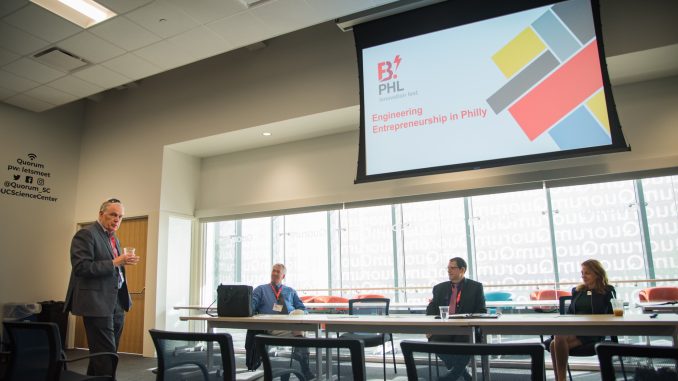
Philadelphia is a city of firsts, Lawrence Gelburd, engineering instructor said, at an event at the University City Science Center on Oct 15.
“What city is home to the university that had the first FDA-approved gene therapy for adult humans?” Gelburd said. “It’s called Philadelphia.”
Gelburd spoke fondly of Philadelphia at the Launching Engineering Entrepreneurship in Philadelphia panel. He discussed how while engineers in Philadelphia have achieved great feats, there are specific barriers to engineering and innovation in Philadelphia.
This event was part of B. PHL Innovation Festival, which hosted its inaugural festival from Oct.15-17. The collection of events aims to develop Philadelphia as the “most innovative city on the East Coast.”
The festival collaborated with Independence Blue Cross, the University of Pennsylvania, Temple University, Drexel University and 500 local companies and nonprofits.
Michelle Histand, assistant Fox School of Business professor and director of innovation at Independence Blue Cross, organized the festival, which featured 250 events in the city to discuss the city’s innovation in arts, business, education, health, technology and social impact.
Tom Edwards, interim director of Temple’s Department of Engineering, Technology and Management, led the discussion at the Launching Engineering Entrepreneurship in Philadelphia panel, of which Gelburd and others were apart of.
“I hesitate to prejudge [the solutions proposed by the panelists] but I’m interested in whether or not we have a sufficient pool of talent that an entrepreneur can hire to run their company,” Edwards said.
Other panelists included Mark de Granpre, director of investments at Benjamin Franklin Technology Partners, and Michele Marcolongo, head of Drexel University’s materials science and engineering department.
They discussed avenues for which the city can assist current and future engineers, especially graduates from Philadelphia’s colleges, in becoming some of the country’s most innovative and successful leaders of engineering entrepreneurship ventures.
One barrier is that graduate students aren’t trained to consider mass production when presenting their product ideas to investors, panelists said.
While academic engineering is focused on inventing – regardless of cost – business-orientated engineering focuses on production and sales, de Grandpre said.
Gelburd wants to teach students these differences before they graduate.
“They have a lot of engineering solutions but they don’t have a lot of knowledge about how a business works, how finance works, how marketing works, so I try to expose them to a broad range of topics,” Gelburd said.
Edwards and de Grandpre discussed the inability to hire engineering CEO talent within Philadelphia and CEOs have to be creative, optimistic and resilient, Edwards added.
“When you’re the CEO of a large company you’ve got a large budget, you can hire people out and give orders,” Edwards said. “If you’re the CEO of a startup, you don’t have a staff. You know you’re probably not even getting paid in terms of a salary, you might only get paid in equity. I imagine you’d have to be very creative in how you get things done.”
Richard Johnson, manager of the Franklin Institute’s youth programs, attended the panel and spoke about STEM Scholars, a competitive extracurricular college preparation program for Philadelphia high school students that launched in 2011.
“We use it as a tool not only to teach about just starting a business but just how to be resilient and solve big problems,” Johnson said.
Other B.PHL festival panels held on campus, like The Blockson Collection: A Conversation with Charles L. Blockson, Working to Cure HIV at Temple and Publishing in the Millennial Age.
“I think the best days are gonna be ahead for Philadelphia,” de Grandpre said. “It’s a jewel of the East Coast but we just gotta talk about it that way.”



Be the first to comment